Another major ACR initiative now being rolled out is the Rheumatology Informatics System for Effectiveness (RISE) Registry. The ACR is tackling the difficult task of building an electronically enabled registry for rheumatology. This project is fast becoming a reality as more and more practice sites connect through their EHRs to the RISE Registry and begin to assimilate and analyze data about their delivery of care.
In my view, these major ACR initiatives are critical to the future success of our organization.
Like many professional associations, the ACR must create value for our younger members. Many of us are products of the baby boomer generation, with its distinctive values. The younger generation is more tech focused, team oriented and committed to a work–life balance. They are also facing massive debts from college and medical school. The ACR is taking a hard look at how culture, science and technology are affecting our younger colleagues. Our first foray into this question was the 2020 Task Force, which in 2013, yielded an in-depth environmental assessment and a comprehensive set of recommendations to address the changing needs of the younger generation. Not surprisingly, the report showed that the demographics and behavior of our workforce are changing. Women comprise a growing proportion of the rheumatology workforce, and the proportion of physicians working part time is on the rise. The younger generation has a different work style, emphasizing the importance of getting the work done over the older generation’s obsession with structure. The ACR has an opportunity to embrace the younger generation and create experiences that will provide solutions to their unique and complex challenges.
Other ACR strategic priorities are no less important. The ACR remains heavily committed to the success of the ACR/ARHP Annual Meeting and our two journals, Arthritis & Rheumatology and Arthritis Care & Research, because they are considered to be survival functions of the College. The ACR recognizes the need to set the standards for quality of care in rheumatology by developing nationally accepted, scientifically rigorous disease criteria, treatment guidelines and quality measures relevant to practitioners.
Advocacy remains a key strategic focus of the ACR, with no shortage of issues to address at both the federal and state levels. The political action committee of the ACR, RheumPAC, has increased our influence with the federal government, but the wheels of government turn slowly and are lessons in patience.
The ACR is proactively facilitating the recruitment, training and retention of well-qualified rheumatology professionals and promoting research through our committees and the Rheumatology Research Foundation. The Foundation has seen unprecedented growth over the past decade and is now the largest private funding source of rheumatology research and training programs in the U.S.
Honoring the Past
I am deeply indebted to the three immediate past presidents of our organization, Drs. Jim O’Dell, Audrey Uknis and Joseph Flood. They led the Executive Committee during my three years of preparation for becoming president of the ACR. Each of these individuals is an outstanding role model and has set an example of remarkable organizational leadership and stewardship.



